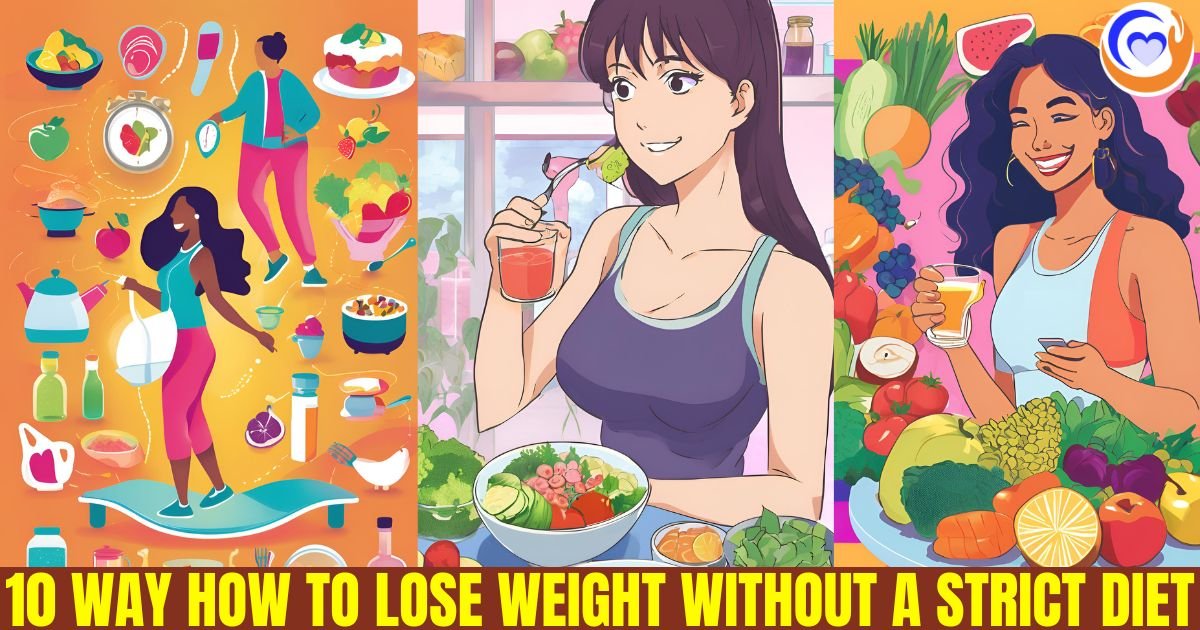Introduction
Sticking to a conventional diet and exercise plan can be difficult. However, there are several proven tips that can help you eat fewer calories with ease. These How to Lose Weight Without a Strict Diet are effective ways to reduce your weight, as well as to prevent weight gain in the future.
Fad diets don’t help you keep off the weight in the long How to Lose Weight Without a Strict Diet term. So what does work? The best diet is not a diet at all, but a way of life that includes food you enjoy, exercise, and healthy habits.
Sometimes How to Lose Weight Without a Strict Diet the struggle to lose weight can be overwhelming, particularly if you’ve tried diets and they didn’t work or didn’t last. But, in the same way that weight isn’t gained all at once, it can’t be lost all at once. There are several simple things you can do to lose weight and improve your overall health, that don’t involve going on a diet or starting an exercise regimen.
Various tips can help a person lose weight without going on a strict diet. These include eating more protein and fiber, getting more quality How to Lose Weight Without a Strict Diet sleep, cutting down on sugary beverages, and more. Practices like chewing slowly and eating more fiber may help you lose weight without exercise or a specific diet plan.
Read More: Unlocking Health with Nutrition and Diet Therapy
Here are the 10 Simple Ways How to Lose Weight Without a Strict Diet
1. Chew Thoroughly and Slow Down

Chewing your food thoroughly makes you eat more slowly, which is associated with decreased food intake, increased fullness, and smaller portion sizes. How quickly you finish your meals may also affect your weight. A review of eight studies reported that people who didn’t eat quickly had a significantly lower How to Lose Weight Without a Strict Diet body mass index (BMI) than fast eaters.
To get into the habit of eating more slowly, it may help to count how many times you chew each bite. Eating your food slowly can help you feel more full with fewer calories. It is an easy way to lose weight and prevent weight gain. Your brain needs How to Lose Weight Without a Strict Diet time to process that you’ve had enough to eat.
Scarfing down your meal in a matter of minutes can often lead to indigestion, and that’s obviously no fun! Chewing your food longer breaks it down more which helps your stomach digest it. In addition, when you eat slowly, you give your brain a heads up to signal your stomach to let the digestion begin. So, not only is your appetite satisfied but so is How to Lose Weight Without a Strict Diet your sense of multi-tasking and efficiency!
2. Sleep Well and Avoid Stress
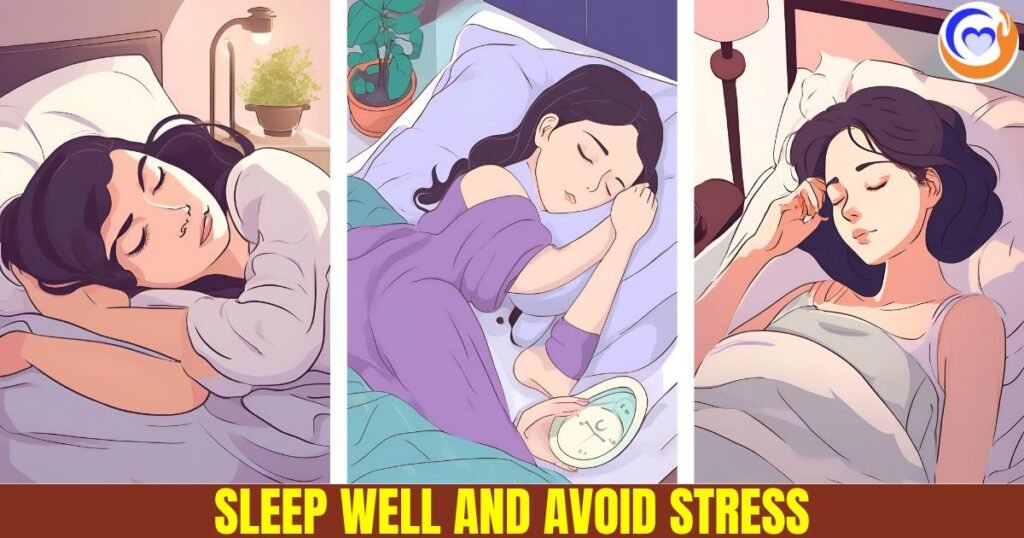
Read More: Sleep Style Quiz
Sleep is a crucial factor in maintaining a healthy weight. Simply improving the quality of your sleep can lead to fewer pounds on the scale. Practice How to Lose Weight Without a Strict Diet shutting off the TV, putting aside electronics, and aim for a solid 8 hours every night. Better sleep will also improve your mood, cognitive performance, and overall health.
Avoid screentime at least one hour before bed. Make How to Lose Weight Without a Strict Diet your bedroom a sleep-friendly space by keeping it cool, dark, and quiet. Follow recommended guidelines on proper exercise to improve overall health and your How to Lose Weight Without a Strict Diet sleep. Aim for at least 20 minutes of exercise a day. Increase exposure to bright light upon waking and throughout the afternoon.
Help regulate your body’s sleep/wake process by eating meals at consistent times during the day and avoiding heavy meals 2-3 hours before bed. When it How to Lose Weight Without a Strict Diet comes to health, people often neglect sleep and stress. Both, in fact, have powerful effects on your appetite and weight.
A lack of sleep may disrupt the appetite-regulating hormones How to Lose Weight Without a Strict Diet leptin and ghrelin. Another hormone, cortisol, becomes elevated when you’re stressed. Having these hormones fluctuate can increase your hunger and cravings, leading How to Lose Weight Without a Strict Diet to higher calorie intake. What’s more, chronic sleep deprivation and stress may increase your risk of several diseases, including type 2 diabetes and obesity. Poor sleep and excess stress may imbalance several important appetite-regulating hormones, causing you How to Lose Weight Without a Strict Diet to eat more.
Read More: What is Sleep Abuse
3. Use Smaller Plates for High Calorie Foods
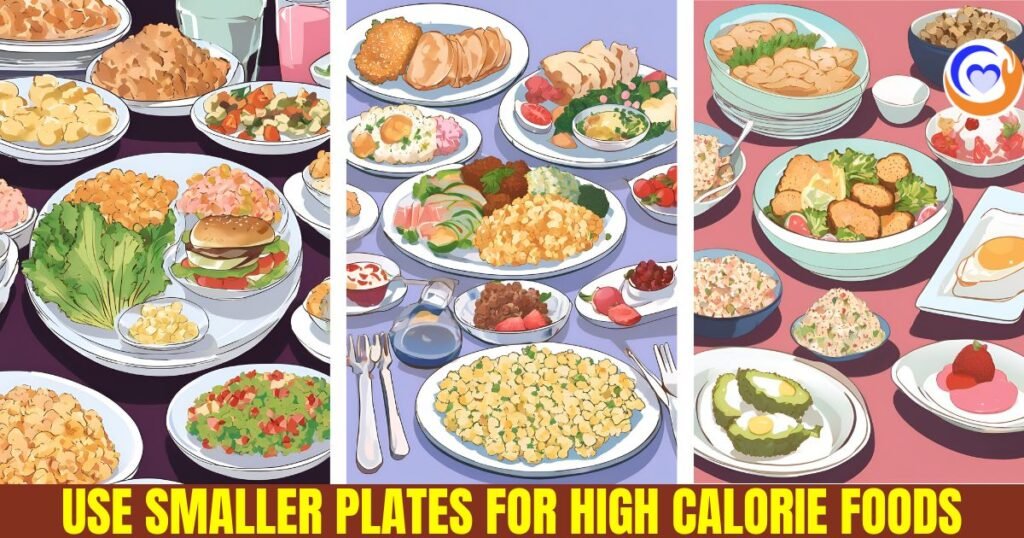
Smaller plates can trick your brain into thinking you’re eating more than you actually are. Therefore, it’s smart to consume higher calorie foods from smaller How to Lose Weight Without a Strict Diet plates, causing you to eat less. This trend could contribute to weight gain, since using a smaller plate may help you eat less by making portions How to Lose Weight Without a Strict Diet look larger.
Studies have proven over and over again that smaller plates lead to smaller portions and less calories consumed. When you place a piece of How to Lose Weight Without a Strict Diet food on a large plate, your mind will think that you need to add more to be satisfied. If you place that same piece of food on a smaller plate, your mind will not try to add more servings How to Lose Weight Without a Strict Diet that are unnecessary.
On the other hand, a bigger plate can make a serving How to Lose Weight Without a Strict Diet look smaller, causing you to add more food. You can use this to your advantage by serving nutrient-dense, lower calorie foods on bigger plates and high calorie foods on smaller plates. The plate-size-effect was not shown to have direct effects on reduction of food intake. Many studies therefore disputed the effectiveness of using small plates for food reduction.
Results showed that plate size had no significant effect on energy intake. The mean differences in intake using the smallest and largest plates in the three studies How to Lose Weight Without a Strict Diet were equivalent to < 142 kJ (34 kcal) and not significantly different from zero. Participants in the third study made significantly more trips to the buffet when they were given the smallest plate. These findings show that using a smaller plate did not lead to a reduction in food intake at meals eaten in the laboratory.
4. Eliminate Sugary Drinks

High consumption of sugar-sweetened beverages, such as soda, has been linked with a higher risk of heart disease and type 2 diabetes. It’s very easy to How to Lose Weight Without a Strict Diet consume excess calories from sugary drinks because liquid calories don’t affect fullness the way solid food does. Reducing your intake of sugar-sweetened beverages may be associated with weight loss.
According to one meta-analysis, replacing sugar-sweetened beverages with low calorie or no calorie sweetened beverages could be linked to reductions in body weight, BMI, and percent body fat. Lower calorie beverage options include water and plain or lightly sweetened coffee or green tea. Think about what you drink in a typical day. Are you taking in some extra calories through sweetened sodas, iced teas, coffees, juices, and energy and/or sports drinks? If so, you’re among the company of many others. Sugary drinks are the number one source of added sugars in our diet.
Sugary drinks have been linked to an increased risk How to Lose Weight Without a Strict Diet of weight gain and many health conditions. Your brain doesn’t register liquid calories as it does solid foods, making you eat more. By eliminating sugary drinks from How to Lose Weight Without a Strict Diet your daily intake, you can significantly reduce your calorie consumption and improve your overall health.
5. Eat Without Electronic Distractions
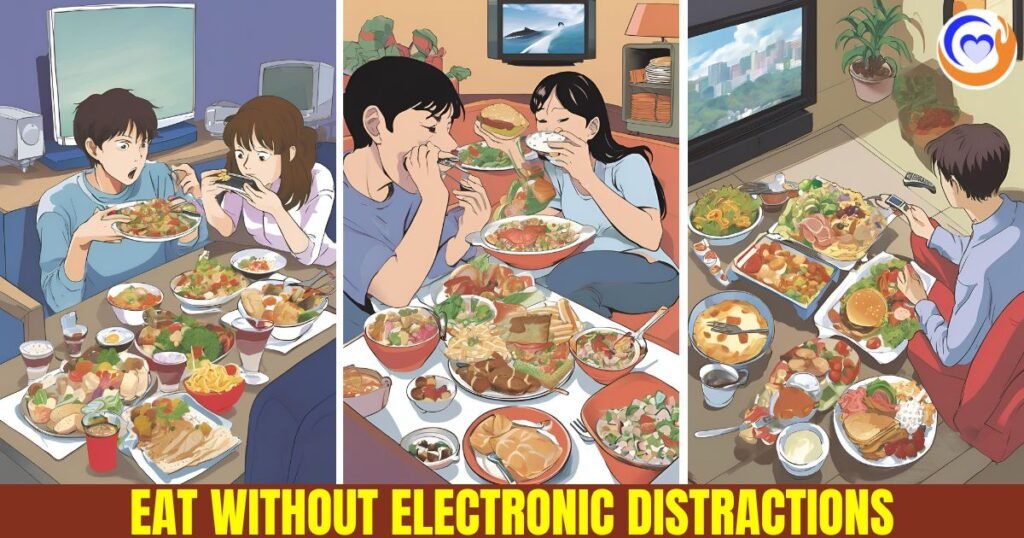
People who eat while they’re watching TV or playing computer games may lose track of how much they have eaten. This, in turn, can cause overeating. One 2013 review of 24 studies found that people who were distracted at a meal ate about 10% more in that sitting. Additionally, absent-mindedness during a meal has an even greater influence on your intake later in the day. People who were distracted at a meal ate 25% more calories at later meals than those who were present.
Paying attention to your meals may help you eat less and lose weight, but more research is needed. Many studies have shown that eating mindfully helps reduce emotional eating, eating in response to visual cues in the absence of hunger, and binge eating. If you regularly consume meals while watching TV or using electronic devices, you could be inadvertently eating more. These extra calories add up and have a massive impact on your weight in the long term.
To avoid this, turn off your e-things. If your desk How to Lose Weight Without a Strict Diet or office is your best option, turn off your computer monitor and set up your phone to go to voicemail. Set a timer on your cell phone for 15 minutes, and then How to Lose Weight Without a Strict Diet commit to focusing on only your meal until the timer goes off. This simple practice can help you consume fewer calories and maintain a healthier weight.
6. Drink Water Regularly

Staying hydrated is one of the best things you can do for your overall health. It can help support physical performance, prevent headaches and constipation, and more. The human body comprises around 60% water, making it crucial for many bodily functions such as lubricating the joints, delivering oxygen throughout the body, and preventing kidney damage.
It’s commonly recommended that you drink How to Lose Weight Without a Strict Diet eight 8-ounce (237-mL) glasses of water per day (the 8×8 rule). Although there’s little science behind this specific rule, staying hydrated is important. Drinking water can help you eat less and lose weight, especially if you drink it before a meal. One study found that drinking water before a meal reduced the amount of food consumed, without significantly affecting satiety. Another study showed that drinking 1 pint (568 milliliters) of water before a meal decreased calorie intake and hunger while also increasing fullness and satisfaction.
If you replace calorie-loaded drinks — such as soda or juice — with water, you may experience an even greater effect. Drinking water before meals may help you eat fewer calories. Replacing a sugary drink with water is particularly beneficial. Most healthy How to Lose Weight Without a Strict Diet people can stay hydrated by drinking water and other fluids whenever they feel thirsty. For some people, fewer than eight glasses a day might be enough. But other people might need more.
Drinking water has numerous benefits. It is crucial for many bodily functions, such as lubricating the joints, delivering oxygen throughout the body, preventing kidney damage, and more. Around 60 percent of the body is made up of water, and around 70 percent of the planet’s surface is covered by water. Perhaps it is the ubiquitous nature of water that How to Lose Weight Without a Strict Diet means drinking enough each day is not at the top of many people’s lists of priorities.
7. Eat Fiber-Rich Foods
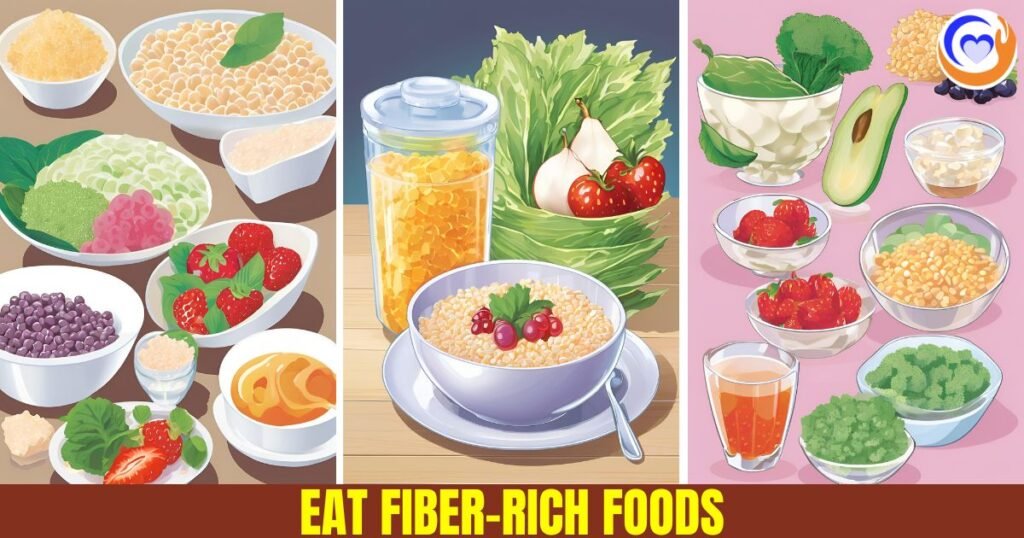
Studies also indicate that one type of fiber, viscous fiber, is particularly helpful for weight loss. It increases fullness and reduces food intake. Viscous fiber forms a gel when it comes in contact with water. This gel increases nutrient absorption time and slows down the emptying of your stomach.
Viscous fiber is only found in plant foods. Examples include beans, oat cereals, Brussels sprouts, asparagus, oranges, and flax seeds. A weight loss supplement called glucomannan is also very high in viscous fiber. If the goal is to add more fiber to your diet, there are lots of great options. Fruits, vegetables, grains, beans, peas, and lentils all help you reach that daily fiber goal.
Fiber-rich foods have a mix of different fiber types. Some fiber helps keep stool moving in the large intestine. Other types of fiber help a person feel full for longer. That can lower the overall calories consumed and help with weight control. And a diet rich in dietary fiber in general has been linked to lower levels of heart disease. Viscous fiber is particularly helpful in reducing appetite and food intake. This fiber forms gel that slows down digestion.
Getting enough dietary fiber is an important part of an overall healthy lifestyle. Dietary fiber, also called roughage, includes plants, fruits, vegetables, legumes, and whole grain parts that your body can’t fully digest. Dietary fiber passes through your digestive tract largely undigested, until it reaches the colon or large intestine where some fibers are fermented by microbiota.
8. Eat Plenty of Protein
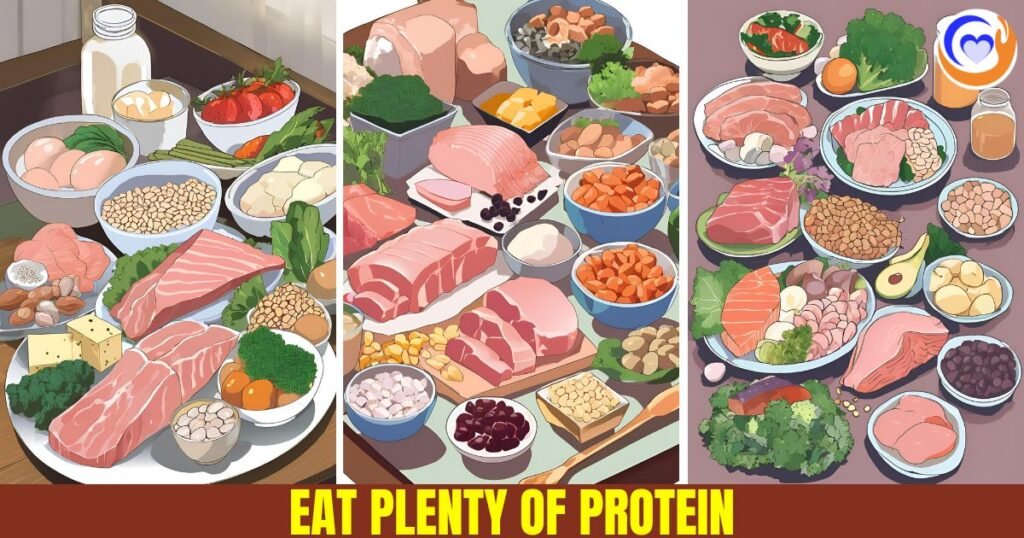
Protein is an essential nutrient that is important in many bodily functions. It provides the building blocks for cells and helps to maintain muscle mass. Getting enough protein daily is essential for your overall health. There is a wide range of foods that are high in protein. High protein foods can include various fruits and vegetables, dairy products, meat, seeds, and more.
Healthy protein sources include eggs, nuts, lean meats, fish, dairy, and certain grains. Most healthy adults need to consume at least 0.8 grams (g) of protein per kilogram of body weight (or 0.36 g per pound of body weight). However, an individual’s protein goals may vary depending on physical activity level and medical history. For the average healthy person, it’s probably best to keep total protein intake to no more than 2 gm/kg of ideal body weight; that would be about 125 grams/day for a 140-pound person with a normal body mass index (BMI).
Lose weight while eating steak, burgers, cheese, and bacon? High-protein, low-carb plans like Atkins and the Zone can work. But you should consider the pros and cons before you decide to try one. It’s hard to provide a specific answer since so much is still uncertain and the experts themselves don’t agree. However, incorporating plenty of protein into your diet can help you feel fuller for longer and support your weight loss goals.
9. Prepare More Meals at Home
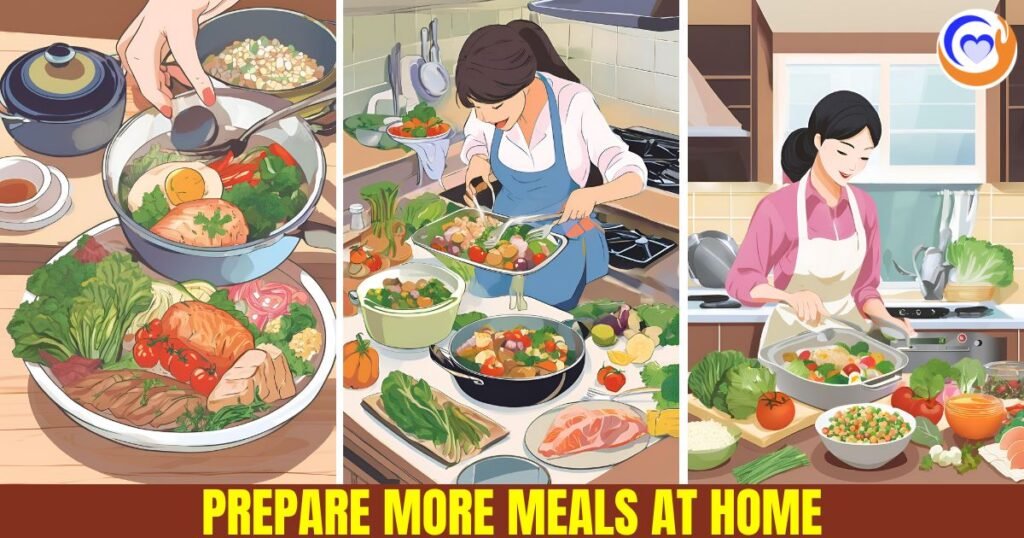
Cooking your own meals at home is a great way to include more nutritious foods in your diet. It might also help promote weight loss. In fact, research suggests that people who prepare more meals at home tend to gain less weight than those who regularly dine out or eat prepared foods. A 2017 study also found that meal planning may be associated with improved diet quality and a reduced risk of obesity.
Create a weekly meal plan – Map out your meals for the week, considering the balance of proteins, vegetables, grains, and other food groups. Make a plan. Set aside some time during your week to plan what you want to eat for meals and snacks, select some recipes or meal ideas and create some menus.
You don’t have to plan the entire week, start with a few days’ worth of meals you know you will enjoy and that are easy to prepare and keep it simple to start. There are a number of online resources for healthy recipe ideas, when choosing a recipe, be sure to use whole food (not processed) ingredients that are mainly plant based such as the recipe at the end of this column.
Purchase “convenient items” that can make meal prep easier, such as canned beans, pre-cut fruit or vegetables, boxed rice, pre-cooked frozen chicken, and pre-portioned turkey patties. Try stocking up on nutrient-dense ingredients and experimenting with a few new recipes each week. Preparing more meals at home may help improve the quality of your diet and support weight loss.
Try stocking up on nutrient-dense ingredients and experimenting with a few new recipes each week. Preparing more meals at home may help improve the quality of your diet and support weight loss.
10. Use a Fitness Tracker
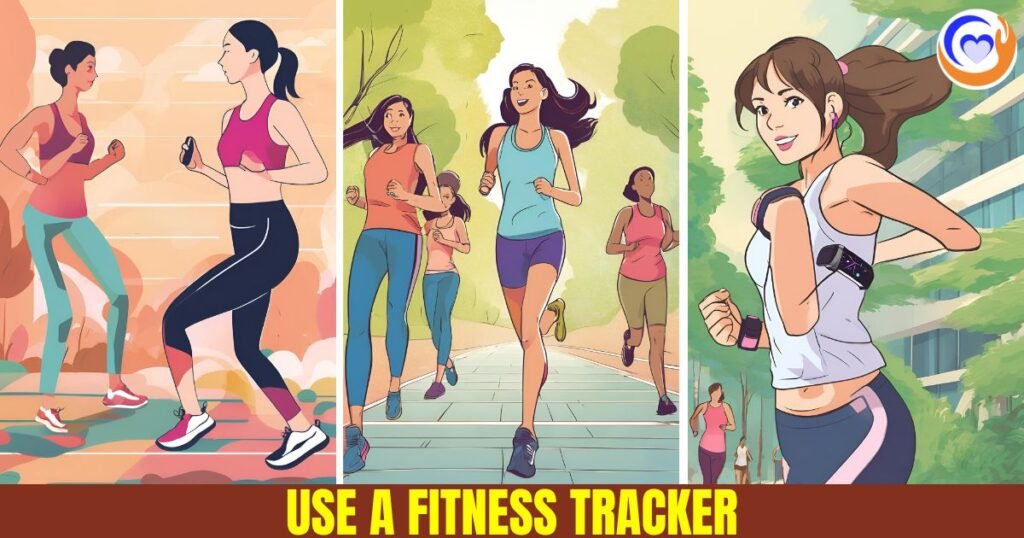
Using a fitness tracker often motivates people to take more steps throughout the day than they would otherwise. Even without making an exercise plan, fitness tracking can instigate weight loss. If you are competitive, you can share activity with friends, holding each other accountable while trying to move more in your day.
Most fitness trackers track the number of steps taken, heart rate, and sleep patterns. Some also have connected apps that allow you to track your overall progress, set goals, and offer guidelines to help you achieve your fitness goals. Omega watch service is here to repair and replace watch parts. Some of the most common brands of fitness trackers are FitBit, Garmin, and Jawbone. Depending on their features, most fitness trackers will start at around \100,butmanyofthemorefeature−richoneswillgoashighas100,butmanyofthemorefeature−richoneswillgoashighas250. Choosing which fitness tracker is for you will largely depend on what features are important to you. At their most basic, the lower-priced models will track your steps and overall heart rate. Higher-end trackers will do that as well as track your sleep patterns, calories burned, and even offer the ability to select specific activities you are doing to provide more accurate fitness reporting toward your goals.
Fitness trackers can be helpful, but may also come with downsides. First things first: Fitness watches can provide a ton of helpful perks. “A major benefit of these devices is the ability to track progress and accountability over time,” says one expert. Just glance at the tracker a few times to get a sense of whether you’re on track for the day. Spend 1-2 minutes checking out your results on the app before you go to bed. Update your goals every week, month, or as appropriate. And create a good routine for keeping your device’s battery charged.
Using a fitness tracker can be a game-changer for your weight loss journey. It motivates you to take more steps, tracks your progress, and helps you set achievable goals. By sharing your activity with friends, you can stay accountable and push each other to move more. Whether you choose a basic model or a feature-rich one, a fitness tracker can be a valuable tool in your weight loss arsenal.
Summary
The article discusses effective ways to lose weight without following a strict diet. It emphasizes that fad diets are not sustainable for long-term weight loss and suggests adopting a healthy lifestyle that includes enjoyable food, exercise, and healthy habits.
The article provides several tips, such as chewing thoroughly and slowing down, getting quality sleep, avoiding stress, using smaller plates for high-calorie foods, eliminating sugary drinks, eating without electronic distractions, drinking water regularly, eating fiber-rich foods, and consuming plenty of protein. Additionally, it highlights the benefits of preparing more meals at home, which can help improve diet quality and support weight loss.
Conclusion
Incorporating simple habits like chewing thoroughly, getting enough sleep, using smaller plates, eliminating sugary drinks, and preparing meals at home can significantly aid in weight loss without the need for strict diets. These practices not only help in reducing calorie intake but also contribute to overall health and well-being.
FAQs
Q: Why is chewing thoroughly important for weight loss?
A: Chewing thoroughly makes you eat more slowly, which can decrease food intake, increase fullness, and reduce portion sizes.
Q: How does sleep affect weight loss?
A: Improving sleep quality can lead to fewer pounds on the scale, better mood, cognitive performance, and overall health. Lack of sleep can disrupt appetite-regulating hormones, leading to increased hunger and cravings.
Q: Why should I use smaller plates for high-calorie foods?
A: Smaller plates can trick your brain into thinking you’re eating more, causing you to eat less. This can help in portion control and weight management.
Q: What are the benefits of eliminating sugary drinks?
A: Eliminating sugary drinks can significantly reduce calorie intake and improve overall health, as liquid calories don’t affect fullness the way solid food does.
Q: How does eating without electronic distractions help with weight loss?
A: Eating without distractions can help you pay attention to your meals, eat less, and lose weight. Distractions can lead to overeating and increased calorie intake.
Q: Why is drinking water regularly important for weight loss?
A: Drinking water regularly can help you eat less and lose weight, especially if you drink it before a meal. It supports physical performance, prevents headaches and constipation, and is crucial for many bodily functions.
Q: What are the benefits of eating fiber-rich foods?
A: Eating fiber-rich foods can increase fullness, reduce food intake, and support weight loss. Viscous fiber, found in plant foods, is particularly helpful for weight loss.
Q: How much protein should I consume daily?
A: Most healthy adults need to consume at least 0.8 grams (g) of protein per kilogram of body weight (or 0.36 g per pound of body weight). However, individual protein goals may vary depending on physical activity level and medical history.
Q: Why is preparing more meals at home beneficial for weight loss?
A: Preparing more meals at home can help include more nutritious foods in your diet and promote weight loss. Research suggests that people who prepare more meals at home tend to gain less weight than those who regularly dine out or eat prepared foods.
Q: What are some tips for effective meal planning?
A: Create a weekly meal plan, considering the balance of proteins, vegetables, grains, and other food groups. Set aside time to plan meals and snacks, select recipes, and create menus. Use whole food (not processed) ingredients that are mainly plant-based.

